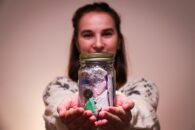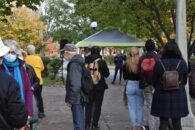A continuous murmur filled the banquet hall at the Shaw Centre on Wednesday afternoon on Feb. 5 as the guests worked on their garden salad. Lamb chops and potato mash topped with gravy made up the following main course, before a triple-layered chocolate mousse was presented for dessert.
The guests had the chance to finish their meal before the guest speaker was introduced: Minister of Northern Affairs Honorary Dan Vandal. He was there to give a speech on behalf of the Northern Lights Conference, who organized the event.
Vandal spoke about the framework put in place by the government to develop the North and its Indigenous communities, particularly in infrastructure and socio-economic growth. Canada will be allocating $2 billion to rural Northern communities across the country, which is to be used by 2030.
Last year, a partnership of health was signed with the premier of Nunavut, Joe Savikataaq, and the minister of natural resources, Seamus O’Regan. It presented each party’s commitment to a shared approach on the construction of a Nunavut recovery centre, which will provide treatment for addiction and trauma. $48 million of the budget will be going towards it.
Of the overall budget, $1.7 billion will be going towards a universal fund for constructing high-speed internet in remote rural areas of the North.
Ex-director of the Baffin Regional Chamber of Commerce and former Carleton University student, Hudson Lester, says infrastructure is seeing noticeable improvements.
“I moved [to the North] when I was seven,” he said. “There were no cell phones, no wifi and very few buildings. Now, we have a lot more housing and business.”
Minister Vandal says that homes still need attention.
“Housing was a priority in every single community I visited,” he said.
Nicole Panipakoocho is a business accounting first-year student at Algonquin College whose aunt lives in the North. She says this priority could be fixed if the government did a better job spreading the word on their development of infrastructure projects.
“My aunt owns a house,” she said. “but she has an issue with the house and she doesn’t know what steps to take [to fix it] because no-one is informing her.”
More on the housing crisis in Northern Canada here.
Furthermore, Canada has also spent $334 million in the past five years to preserve, promote and revitalize the Indigenous languages of Inuktitut and Inuvialuktun, according to Vandal.
Northerners want the development to respect Canada’s rich natural environment and to be implemented in the interest of the Indigenous Peoples.
“That is how it should be,” said Vandal. “putting the decision-making in the hands of those who live there.”
The minister brought up another issue in his speech: climate change.
He says the Arctic is undergoing the fastest transformation due to climate change – at three times the global rate – and the physical changes impacting the Peoples.
Retracting sea ice and thawing permafrost are exposing coastlines, causing roads to crack and underground utilities to rupture in coastal communities. Food and water resources are impacted by shifting migration patterns and melting glaciers, as well.
Find out more about permafrost here.
According to Vandal, Canada has invested $186 million over five years, once again, to address climate change in these communities. The money will be going towards introducing renewable energy sources, such as the solar projects in Old Crow, Yukon.
Almost two-thirds of the funding has been used to date.
“It is not enough for Northerners to merely survive,” said Vandal. “Northerners must thrive.”



